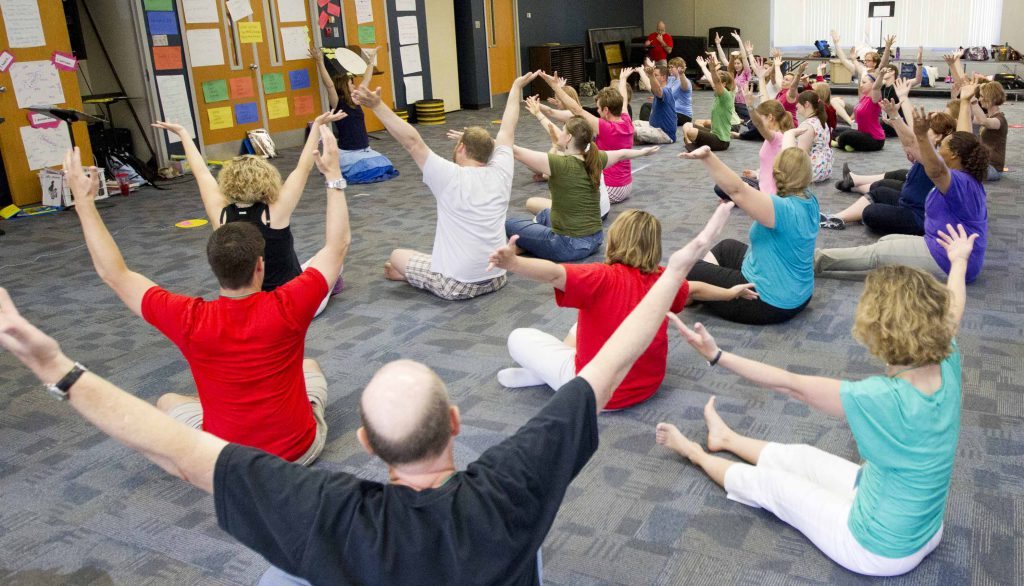
Making It Work: Orff Level II
Title Photo Credit: Jennifer Mishra, University of Missouri St. Louis
You’ve taken level I and you might be wondering “should I take level II?” Maybe you teach a population of mostly younger students. Maybe you are still working to process your level I materials and experiences. Maybe it has been years since you took level I. Here are some reasons to consider continuing your journey through the Schulwerk regardless of your situation.
Taking all three levels of Orff provides a more complete understanding of what Orff Schulwerk is. This understanding will help you prioritize your lesson planning, advocate for your program, and teach with a deeper knowledge of what and how you are teaching. Level II is a sometimes magical, sometimes overwhelming two weeks. In level II you will review level I practices and content to refresh what you have already learned and set you up for the many new things you will learn and do. You may recall a time in your classroom when you tried a lesson from your level I class that may not have gone as beautifully as you expected. Level II dives into the process of how to get from point A to point B. The practical pedagogy becomes more of a focus. You will notice and experience common techniques used by your instructors and recall experiencing those same techniques with your level I teachers. You may be asked to lead a short warm-up, teach a small group of your classmates a short lesson, pair up with a classmate to teach the class a sample lesson, or design a lesson for your own students.
Level II content builds on the Level I content. It is rewarding to move beyond the call, chant, and pentatonic scales into half steps, diatonic modes, and triads. Meters and rhythms become more complex yet seem possible to use with children through the elemental style of teaching and learning that happens in Orff Schulwerk. Level II content requires a deeper understanding of basic music theory principals. If this is an area that worries you, brush up on some of the terminology and listen to the Music for Children recordings. Expect that there will be some assignments in your level II class arranging, composing, and improvising with this new material.
One of the biggest benefits of taking level II is growing as a student, teacher, mover, and musician. You may hear one of your teachers say, “for your students…” but they also may say, “this activity is for you.” Because of the intensity of working with the same people for two weeks, every day, 7 hours a day, Level II students often bond and make connections in ways they never thought of with people they might not have otherwise. It can be really special if you are able to stick with your same cohort from Level I to Level II to Level III.
In general, the benefit of taking Level II is that you will get better at everything you experienced in level I. You will give yourself the opportunity to learn, observe, and practice for two uninterrupted weeks. Orff Schulwerk teaching takes time, practice, and reflection. Level II will allow you to see more opportunities in your own teaching and to become more fluent in your process. You will gain familiarity with materials (original source, music from other countries, cultures, in other languages, and others). You will leave with a greater competency to compose and arrange music for your students. You will become better at analysis, allowing you to more easily recognize high quality pieces and to “break down” music for your students. You will observe different teachers work in their unique Orff way. You become a better teacher after having been a student again and will have a greater understanding of your own students when you return to your classroom.
So, you’ve decided to go ahead and take level II. Congratulations! Here are some things to think about before jumping back in and what to expect and some ways to prepare.
Reviewing your level I experience is a great first step to get ready for level II. Look at your notes and refresh your memory regarding the vocabulary, theory, and teaching techniques.
The structure of the day will be similar to level I, most of your day with a basic or ensemble teacher, an hour and fifteen minutes each with a recorder teacher, a movement teacher and some time dedicated to special topics. Some days you may join with the other levels students in your course. You can safely assume there will be ensemble, small group, partner and/or individual projects and exercises. Sing, say, dance, play, and create: you will continue to do these things in all classes.
Be prepared for a higher level of expectation of your technique, risk-taking, and artistry. Take a good look at and listen to your technique and tone on barred instruments, drums, and recorders. Review elemental forms that might inform your improvisations. Improvisation opportunities will be plentiful using all media and will incorporate content introduced in level II. It is likely you will feel more comfortable in one area than another. Trust yourself and trust that your instructors will provide a safe space for you and your classmates to give things a try. Remind yourself that every person comes to the group with different strengths and that your goal is to improve your skills and contribute what you can to the class.
Expect to have homework and expect to practice in the evenings. You may be asked to lead the class or a small group in a short vocal warm-up or rhythmic exercise. Level II students often prepare potential lesson plans or teach a sort practicum lesson.
Brush up on music theory. In level II the pentatonic scales pave the way for the full diatonic scale. With more notes come more possibilities and more terminology: modes, triads, scales, harmonic progression, cadences, transposed, parallel fifths and parallel octaves. Listen to modal pieces found in the Music for Children Orff recordings to get that elemental sound in your ear. Listen to pieces in different meters: 2, 3, 4, 5, 6, 7, and more!
Pick up a recorder. Be prepared to play both soprano AND alto recorder. Even if recorder is not your strength, familiarize yourself with the patterns of fingerings used most often on the soprano recorder. Get a feel of different sizes of the recorders. (Believe me, if I can do it – you can do it!) The higher the quality your instrument, the better the sound you produce. Consider upgrading your freebie, two-piece, pink or blue recorder. There are plenty of affordable choices that produce a higher quality sound with greater ease.
Prepare your body for lots of movement. From sitting on the floor, moving instruments, folk dancing and creative movement your body will be active. Take a yoga class, go contra dancing, incorporate some stretches into your daily routine. Drink lots of water, eat nourishing foods, and get some sleep.
Everyone has a different reaction from their experience in level II. For me, level II was the point at which I discovered how much I loved this work. It is also the point at which I realized how much I did not know how to do the work and that the only way to improve was to keep learning and trying things back in my classroom. The Schulwerk can be exhilarating, overwhelming, emotional, beautiful and stressful. This work can be extremely satisfying and fulfilling personally, professionally, and artistically. I encourage you to take the next step in your Orff journey by taking Level II.
Interested in finding an AOSA approved course? Click here to visit their website and to learn more!
See all posts by Betsy Kipperman
14 Comments
Leave a Comment
Sign up for latest Orff Tips, Lesson Plans and Advocacy Tools
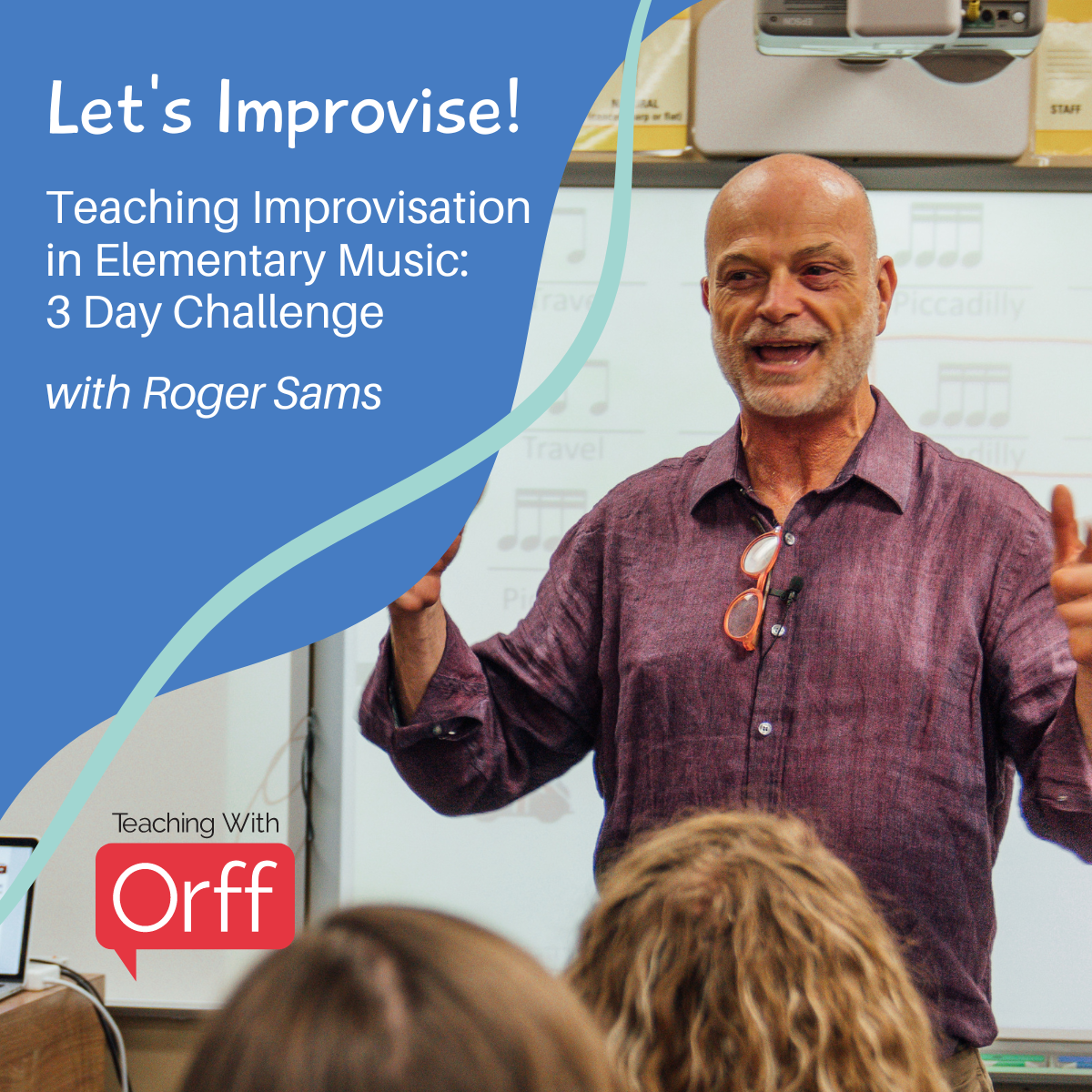
Empower your students to create their own music in this free 3-day challenge with Roger Sams. (Lessons delivered via email)

Learn about the legendary factory that started it all and why so many teachers like you love our instruments.
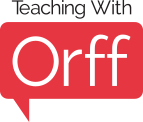
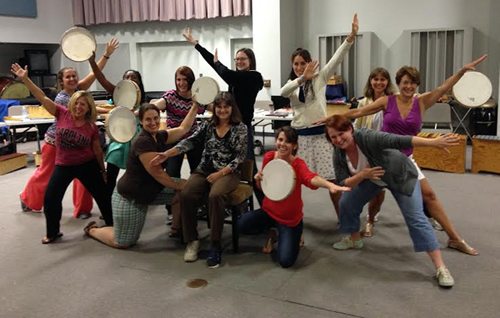
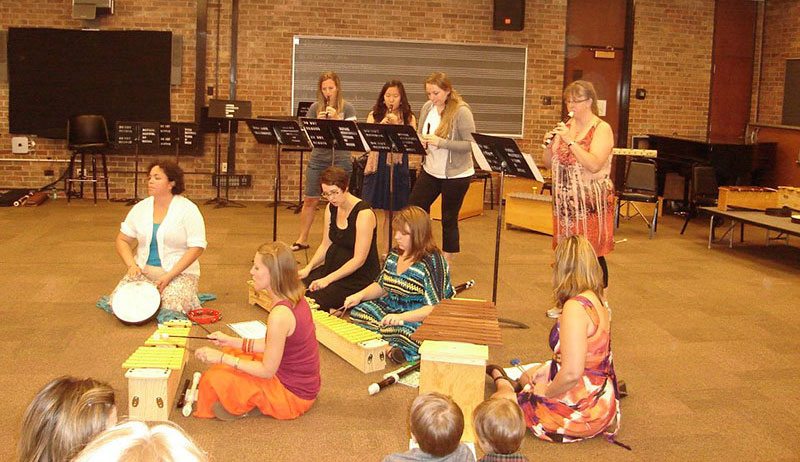
Thank you, Betsy! This is great information.
Betsy, I am proud that we are in the same chapter. You always have useful information to share that works!
Ditto to that, Betsy! And extra-special thanks to you for bolding and italicizing the 5 and 7 meters! 😉
Thank you for such a thoughtful and detailed article, Betsy!
Wow! Nice work, Betsy!
Thank you for your detailed information. Very part is true for me. I loved level II and even did level III. It was hard work, but worth every minute.
Eileen
Betsy,
This is a great intro to Level II for those considering this step (which I hope will be everyone!). Betsy knows what she is talking about!!!
I’d love to see a similar piece about Level III!
Betsy this is so well written! I’m going to suggest my SMU students read it for sure!
Reading this article made me reflect on the level 1 Kodaly training I did this past summer in the Rio Grande Valley. I completed Orff level 1 in Summer 2016 at TAMUK with Dr. Tu. It was very transformative. I was ready to give up on teaching. Orff saved my teaching fire. Although I still have more questions. I pursued the other spectrum, Kodaly. Kodaly was intense and pushed me as a musician like never before. Constant homework assignments and skills gained were only to sell us into the philosophy Kodaly sees in us as educators, that we are more valuable than any conductor or composer. We are at the frontlines. As I pursue my graduate degree in Ethnomusicology and continue to contribute as an educator, I leave these experiences with more questions. I want to gain more in terms of the contrasting perspectives, as I work with both areas. As I write my lesson plans and look at the cross-curriculum, I start seeing a beautiful synthesis. I’m excited to venture into the next chapter of my career for level 2. I welcome the challenging aspects to come. I’ve noticed a lot of Kodaly and Orff training fall under the same dates, which stinks if someone like me would like to take both!
I look forward to learning more from this PLN II session! Hopefully, there is a level 2 training near the Rio Grande Valley that doesn’t coincide with Kodaly level 2 training in mid to late July.
Betsy,
Thank you for this well written article. It is very informative and helpful. I learned so much and truly enjoyed level I last summer. The monthly chapter ORFF workshops have been informative and inspiring as well. I am looking forward to continuing my ORFF journey. I have registered for level II 🙂
Perfect advice! Keep them coming back! Thank you Betsy!
Cooee Betsy! I think you should come and teach here too. 😉 Beautifully written, really informative, welcoming and warm. I think I’ll come to be taught by you….
Very interesting article. I feel more motivated than ever to do my level 2. Looking forward to be part of Level 2 with you at GMU this coming July 15th.